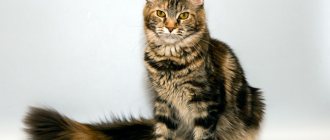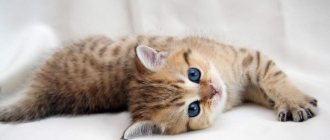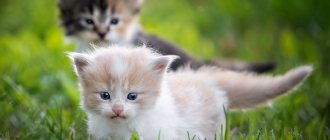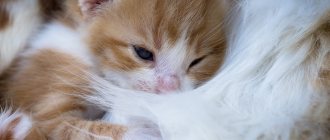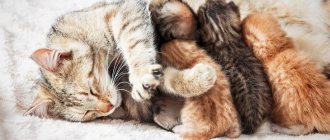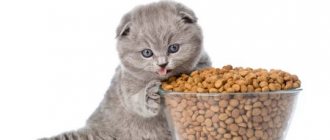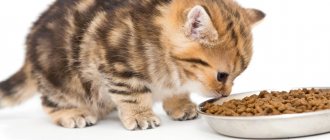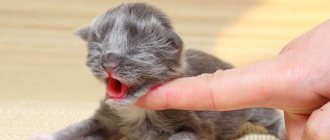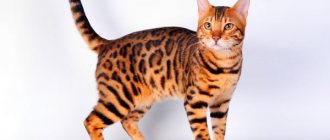In order for a new family member to fully develop and grow up absolutely healthy, it is necessary to develop the correct diet from the first days of the animal’s stay in the house. You will learn in our article what to feed a British kitten and what foods are best excluded from the menu of your four-legged friend. Take this issue seriously and responsibly, because healthy eating is the key to a long and happy life for your new furry friend!
A kitten of the British breed is an amazing animal with a beautiful face and funny manners! You won’t be bored with this pet; they are active and playful, but quite demanding in care.
You can find out the difference between a Briton and a Scot here
Feeding a British baby at 1 month
Any living creature needs breast milk after birth, and the British baby is no exception. In the first month of life, a cat should be under the reliable care of its mother cat. Her milk contains all the components necessary for growth and development.
During this period, it is important to provide the cat with proper nutrition so that the remaining milk can receive all the necessary substances, thanks to which the kitten will develop a strong immune system.
If the nurse has some health problems, or for some reason the kitten cannot be under the care of the parent, the owners of a furry pet should develop a healthy diet for the newborn. So, what to feed a British kitten in the first month of life:
- In pet stores you need to purchase special milk for newborn kittens. This product contains a correctly selected composition of components, close to breast milk.
- Gradually, mashed egg whites and liquid semolina porridge cooked in skim milk can be added to the diet. Portions should be minimal. The number of feedings per day is 3-4 times. These foods are also included in the diet of breastfed kittens.
Primary requirements
Every cat owner should remember that your pet is one hundred percent a predator. This is where cats differ from dogs - over thousands of years of domestication, dogs have learned to eat the same food that their owner eats, but cats still require meat in order to grow and develop normally.
British babies are no exception in this regard. The basis of their diet should be meat . It is recommended to feed a British cat beef products. This meat is easily digested by your furry pet's delicate stomach.
It is best to feed cooked meat, as raw ground beef may contain parasitic larvae that are dangerous not only to cattle, but also to predators.
Feeding a British baby at 2 months
The first month of the furry baby's life has passed. His body now requires additional elements. Before feeding a 2-month-old British breed kitten, you need to study the list of acceptable foods necessary for proper growth and development.
Starting from 4-5 weeks of life, solid food can be gradually introduced into the menu. It is better to start with low-fat beef, previously frozen and finely chopped. For one feeding, a serving of 10-15 g is sufficient.
Your baby's diet should also include:
- fresh milk;
- delicious milk porridges cooked with low-fat milk;
- natural soft cheese;
- low-fat cream;
- egg yolk;
- fresh cottage cheese.
You can supplement the menu with pates and canned food purchased from specialized pet stores or veterinary pharmacies. The manufacturer's recommendations regarding age restrictions must be indicated on the packaging.
Experienced breeders do not advise buying cheap products of questionable quality. If you want to pamper your furry baby, buy him a good product from a reliable manufacturer!
Important:
- when introducing new foods into your lop-eared pet’s diet, monitor his body’s reaction;
- do not exceed the permissible limits when feeding the baby, overeating can be fraught with consequences;
- Don’t be lazy to cook separately for a purebred cat; he should not eat food with seasonings, spices and other additives typical of foods consumed by humans.
Mixed nutrition - the choice is yours
You, dear owners of British cats, must decide which feeding option is right for you, and then bear responsibility for your choice and for the health of your animal. You may also find it useful to read the article “Prevention of ICD in neutered cats.”
5. You cannot feed or give dry food as a treat during natural feeding, and vice versa. Not once a week, not once a month, not possible.
6. It is strictly not recommended to mix food from different manufacturers. If you feed your British animal dry food and want to diversify the diet with wet canned food, then this should be no more than 25% of the daily diet, and the canned food should be from the same manufacturer and from the same line of food.
Feeding a British baby at 3 months
The three-month-old British shorthair delights his new family with his first achievements and skills. At this age, kittens already go to the toilet on their own, spend a lot of time in active games and enjoy exploring the world around them.
In order for this process to be as beneficial as possible for the growing body, it is necessary to continue to properly feed British kittens, including all new products in the individual menu.
What to feed British kittens at four months:
- milk;
- egg yolk;
- boiled or raw frozen meat (beef, chicken);
- by-products are added to the diet;
- dairy products;
- canned food for 3 month old kittens;
- boiled sea fish without bones;
- porridge;
- grated vegetables.
The number of feedings per day is 4 times. Portions are moderate. You should not give your kitten several new foods at once. It is necessary to gradually introduce additional ingredients, not forgetting to monitor the baby’s condition.
What can't you eat?
It is strictly forbidden to feed a two-month-old, six-month-old and a kitten over a year old spicy, fried, salty, smoked and sweet foods. You cannot add herbs or spices to prepared dishes. Legumes - peas, beans, lentils - are contraindicated for the British. The animal's stomach does not digest potatoes well, so this product should also be excluded from the diet. It is contraindicated to give adult cats whole milk, as it is not digested by the intestines and causes fermentation processes in it.
Feeding a British baby at 4 months
At the fourth month of life, the fold-eared purebred cat is already a fully formed animal, with beautiful shiny fur and adult behavior. It has already increased significantly in size, its weight exceeds its original parameters by about three times. At this age, you can safely add special dry food for British kittens to your diet. The number of feedings is reduced, and the dosage of portions is increased.
The main menu continues to be dominated by products acceptable for feeding kittens 3 months of age. Approximately 25-30% of the total diet consists of dry food. During this period, the owner needs to decide on the manufacturer of cat food, giving preference to proven brands. You can consult your veterinarian on this issue, not forgetting to take into account personal observations of your furry pet.
High-quality food is sold at a higher price, but this is not a reason to save on the health of your new friend. You should not buy food for your domestic cat in dubious places; it is better to purchase nutritious products from pet stores that are certified for animal products.
Breeders do not recommend purchasing feed in bulk at local markets. The quality of such products is very questionable, which means that feeding these compounds can negatively affect the health of the animal.
Meeting all family members
Children love animals very much and show great interest in them. Tell your child how to properly pick up a cat, how he shows his dissatisfaction by wagging his tail, and that you shouldn’t squeeze him too hard and drag him around the house.
Perhaps you have another animal at home? Then you should initially not introduce the new guy to the old one for a couple of days. The new one will still get used to it, but the old resident will already feel the emergence of a new one. At the same time , pay sufficient attention to both the first and second pet so that jealousy does not arise. Arrange a meeting with them in a few days. They need to be in the room at this moment, and each of them should have a place to retreat, in case something happens. If an undesirable reaction occurs, limit contact with the animals for a couple of days and introduce them again.
Feeding a British baby at 6-12 months
In the second half of the first year of life, the British reproductive system matures. This period is somewhat difficult both for the pet itself and for its owner. Some difficulties may arise when raising a British cat, which is already beginning to show its character.
In order for your furry friend to show maximum calm and not upset his owner with hooligan actions, it is necessary to continue proper nutrition, thanks to which the British dog will develop good behavioral manners and obedience.
What can you feed a British cat from 6 months of age:
- dairy products;
- egg yolk;
- boiled meat, frozen;
- boneless fish;
- porridges of different types;
- pieces of fruit and vegetables;
- crackers, rye bread;
- offal;
- ready-made canned food for cats by age;
- dry food is a priority, making up about 50% of the total diet.
From this age, the animal’s body no longer copes well with digesting lactose, so milk and milk cereals are gradually removed from the pet’s diet.
At 6-8 months, the number of feedings per day is 3 times; closer to a year, the number of meals is reduced to two times.
Necessary supplies for a new family member
To make your little one feel comfortable in your home, you need to carefully prepare. Buy for him:
- a house where he will sleep and relax if he wants to be alone;
- bowls for water and food;
- toys;
- pet carrier;
- buy food;
- tray and filler for it.
It is better to take plastic carriers. Despite the fact that the plastic one is very bulky during transportation, it holds its shape perfectly and if something happens, the animal will be comfortable there.
So that the British cat has his own corner for relaxation, buy him a sleeping place, or make it yourself. Take an unnecessary box from under furniture, equipment (in terms of volume it should allow the cat to lie stretched out). Make a hole for the entrance, cover the bottom of the box with an old jacket, a pillow, and place it in a cozy corner.
There should be at least two bowls. For water and food. Keep the water fresh.
Buy a special post where you can sharpen the claws. If you have an old frame or piece of wood, make it available to the kitten.
Introducing homemade food into the kitten's diet
Owners of British breed cats independently determine the type of food for their animal. You can give priority to feeding your pet canned food and dry food created specifically for kittens, but in any case, a carnivorous animal by nature needs meat, so this ingredient must be present in the daily diet.
The best type of meat is beef. It should be given raw, after having been frozen in the refrigerator for three days. Before feeding, the product is treated with boiling water, which allows you to destroy dangerous helminths and other harmful microbes.
It is better to feed young British kittens with ground beef prepared independently. You should not add salt and other spices to the finished composition that are unacceptable for feeding purebred cats. You can also give your baby finely ground raw food.
A large, straight-eared pet can independently absorb meat from larger pieces, but to avoid unnecessary problems, experts still recommend pre-cutting the meat to make it easier for the animal to absorb food.
Starting from 2 months of age, a British dog can be given boiled beef liver once a week. About 3-4 times a week, boiled offal of various types is added to the main menu. The serving should not exceed 100 g.
Kittens also need lean fish, preferably of sea origin. It can be served raw. The product is first frozen, doused with boiling water, and cleared of bones and skins. Fish should be given to a Briton no more than 2 times a week.
Once a week, the diet of a furry family member should include boiled chicken eggs, in particular the yolk, previously crushed. This product can be served in combination with canned food or porridge.
As for the porridge:
- up to three months, a small kitten is fed milk porridge, diluted with water, without sugar;
- from 6 months, porridge is cooked exclusively in water, without milk;
- this product is added to the diet 3-4 times a week;
- priority is oatmeal, semolina and rice porridge;
- You can give a ready-made dish in combination with meat ingredients or canned food for kittens.
The diet of a domestic cat should also include boiled vegetables: cauliflower and carrots (good for the eyes). A drop of vegetable oil is added to the crushed product. They can also be mixed with porridge and meat.
3-4 times a week, a British kitten should be given low-fat fermented milk products: kefir, cottage cheese, yoghurts (natural), cream, kefir. Adult cats should have this food no more than 2 times a week. Be sure to keep an eye on the expiration dates of store-bought products. Do not feed your furry pet dairy products that have expired and are of questionable quality, as this can cause serious poisoning and other adverse consequences.
The British diet, based on natural products, is very useful and necessary for healthy growth and proper development. You cannot feed the animal food from your table, only separate food preparation, without salt, spices and other additives! Avoid overeating, as your cat may become fat and develop chronic illnesses.
Safety first
Take care of the safety of the chosen toy for your kitten, because they are like children. There should be no parts that a Briton can swallow: excess fluff, elastic, shiny, small beads. Toys should be soft and made of good fabric. Avoid purchasing hard or sharp toys.
Make sure everything in the house is safe for the kitten:
- Close access to all the cracks where a Briton can climb in and not get out until he grows up;
- Keep the bags out of the reach of kittens, because they are such little naughty creatures, while playing, they can get stuck there and suffocate;
- Cover your trash at night. A British person will not be tempted to find and eat a sausage roll;
- Place nets on the windows so that the Briton does not stare at the bird and fly away with it;
- Don’t leave threads, raindrops, or balls in a place accessible to a Briton; he can easily eat it all;
- While the Briton is very small, be careful. He remembers that you may not notice him, step on him, sit down, lie down;
- Before the first vaccination, try to limit your pet’s contact with other animals and various objects from the street;
- Do not leave chemicals or detergents open or unattended;
- It is better to keep dry food in the pantry away from the cat.
Dry and wet food for the British
A more simplified method of feeding a British cat is based on ready-made food. This option is great for owners who are unable to regularly prepare healthy food for their pets. The main thing is to choose the right food and calculate the daily intake in accordance with the age of the kitten.
Responsible manufacturers create high-quality products that contain all the vitamin and mineral complexes necessary for the British. The range of such products includes a wide variety of compositions in dry and canned forms. When choosing, be sure to study the manufacturer’s recommendations published on the packaging!
Which food to choose, dry or wet, is up to you! You can combine these two types in an approximate ratio of 50/50, 60/40 or 70/30%. If the British cat is fed exclusively dry food, it is necessary to provide the animal with free access to clean drinking water.
The canned product is placed in a clean bowl in strictly measured quantities for one feeding. It is unacceptable to leave food “for later”; after each feeding, the animal’s bowl is cleared of product residues and thoroughly washed with clean water.
Advice from experienced breeders:
- For favorable growth and development, combine dry food with wet food. It is better to serve canned products for breakfast and dinner, and during the day you can feed your pet with dry food.
- Even if you feed your cat exclusively prepared food, regularly add pieces of fresh meat to the standard diet.
- The best food for a purebred British dog is premium (for example, Whiskas, Hills). Do not buy the budget version of the product, as these formulations do not contain enough necessary elements for proper growth and development. After feeding with cheap food, complications in terms of physical health are often observed. If you consume low-quality products, your kitten may develop urolithiasis and other chronic ailments.
- If you plan to castrate a mature British cat, buy special food with the appropriate label. These products contain a balanced complex of essential microelements, taking into account hormonal changes in the animal’s body. Similar rules are followed for cats that have been sterilized.
TOP 12: RANKING OF THE BEST FOOD FOR BRITISH CATS
Food rating for the British:
- Orijen – 80% protein, 20% vegetables and fruits
- Acana – 70% protein, 30% vegetables and fruits
- Wildfield – 60% protein, 40% vegetables and fruits
- Farmina – grain-free food + probiotics, medicinal herbs
- Trainer – food for animals with sensitive digestion, kidney problems, etc. These foods help maintain health. Suitable for animals with gluten intolerance. Products for processing into feed are steamed.
- Science Plan (Hills) is a good food for everyday nutrition, well digestible, does not cause allergies, natural antioxidants and preservatives, a wide range of feeds, excellent distribution.
- Bosch cellulose and maize additives are harmful and can cause allergies.
- OK Passion – not suitable for sensitive cats
- Purina ProPlan - high in protein, rice is used as a cereal, but wheat flour is still added. Probiotics.
- Royal Canin (Royal Canin) - there is an everyday line and a medicinal one. Everyday series - a lot of preservatives (the Russian line of food is not recommended, it is better to give preference to the French one). The medicinal series is perfectly balanced and has good reviews from veterinarians and has a healing effect.
- Premil – additives and flavor enhancers. No gluten.
- Josera - Overall a good food, it rarely causes allergies, it contains corn gluten.
*All these foods contain minerals, vitamins, and beneficial additives.
The material is for informational purposes only, presented solely as an example for comparison.
Take proper care of your pets and choose the best food for them!
Prohibited Products
British cats should not be fed the following foods:
- fatty meat;
- bones;
- river fish;
- fatty fermented milk products;
- egg white;
- sausages;
- conservation (for people);
- fried foods;
- spicy and salty foods;
- sweets, chocolate;
- baking, baked goods;
- food from your table.
The right approach to feeding a British breed cat is the key to good health and long life for a furry family member!
Which diet to choose: the pros and cons of “drying” and “natural”
The owner must decide immediately what to feed British kittens. You cannot mix or constantly change natural feeding and ready-made food. Even single-component holistic products are not recommended to be alternated with conventional products.
The good thing about ready-made food is that you can buy it in small wholesale at a pet store or order it on a specialized website. Also, a jar of kitten food is usually designed for a daily diet, which means you won’t overfeed your cat. And in general, a ready-made diet is always more convenient than preparing food for your cat every day.
But this is where the cost of feed comes into play. If you do not think through the diet in advance and do not purchase with maximum profit, then the nutrition budget for a British kitten can be significant. These breeds can only eat super-premium or holistic food, and they are not cheap.
The natural type of feeding also requires planning and preparation, but you can still combine purchases with your own daily consumption. For example, you can use all the milk suitable for kittens for baking. The kitten eats its portion from the package, and the impressive leftovers will always find use in human recipes.
The same goes for meat - lean turkey fillet can be easily processed into semi-finished products for a kitten; you can cook any excess for yourself. Vegetables, fruits, cereals - all these are products for general use that are not purchased selectively only for the kitten.
The issue of daily cooking can also be solved with natural feeding. There are a lot of recipes for cats that help you create a diet for several days, although you will still spend more time on them than on ready-made food.
One of the disadvantages of natural products is the need for self-dosing, because we must not forget about the daily amount of food and the volume of each serving. Evenness of food intake is very important for a small British kitten.
Also, with a natural diet for a British kitten, it is difficult to maintain the balance of vitamins, which are already collected in ready-made food, taking into account breed and age characteristics. A veterinarian will help you resolve the issue, especially if you keep a diary of your kitten’s food.
A little about the breed
It is believed that British Shorthair cats trace their ancestry back to the famous Cheshire cat. But seriously, this is one of the first officially recognized and standardized breeds: already at the first London cat show in 1871, the British were widely represented.
British cats have dense, plush fur.
British Shorthair cats have a strong build, developed pectoral muscles, a short thick tail, strong dense legs and a round massive head. A captivating feature of their appearance is their thick cheeks and round amber eyes. Another distinctive feature of the breed is its dense, plush coat. More than 60 color variants are recognized, but the main ones are lilac and blue.
British cats have round amber eyes
How to feed a cat when it is sick
The British, although known for their excellent health, have their Achilles heel. Even a few. These are their signature ailments that can be combated with a well-designed diet:
- If you have urolithiasis, you should consider reducing the composition of minerals. Pets who eat dry food often fall into the mineral risk zone. The food was probably chosen incorrectly. Therefore, it is imperative to ensure that there is no such harmful component in the composition. There must be clean, fresh water in the bowl - without this, you can forget about ridding your cat of kidney stones.
- With hypertrophic cardiomyopathy, it is advisable to take a closer look at the amount of salt absorbed by your pet. The less salt the better for the fluffy core. Previously, there was an opinion that such animals should consume less protein. This point of view can hardly be called correct, since as a result the animal lost a lot of muscle mass. As a result, they lived fewer years than they could have.
The British cat is extremely prone to obesity. We can say that she is the Achilles heel of furry companions. But well-chosen food will help avoid such troubles. Like many others.
Previous
British catsDiseases in British cats and kittens - symptoms and solutions
Next
British catsCare and maintenance of the British cat breed
How to care for a 1 month old British kitten
Has a little bundle of happiness appeared in your home - a British kitten? Congratulations, because this is a truly significant event in both his and your life. Because British kittens at 1 month really need care, affection and boundless love. And if you can present all this to him, he will respond in kind.
